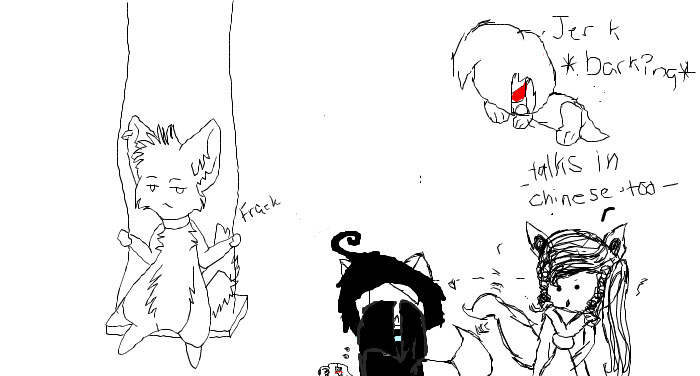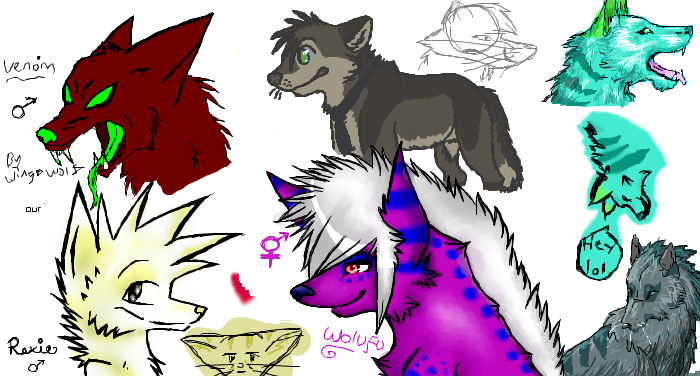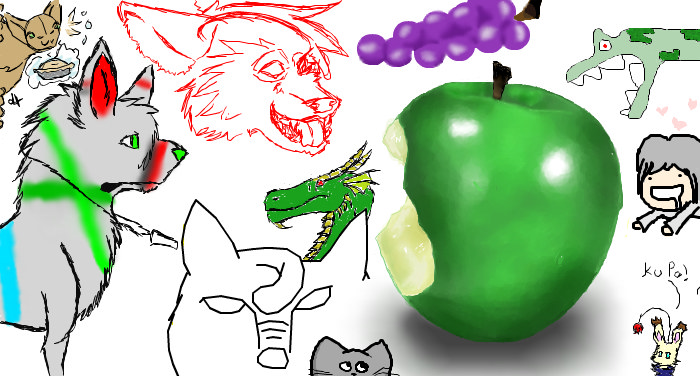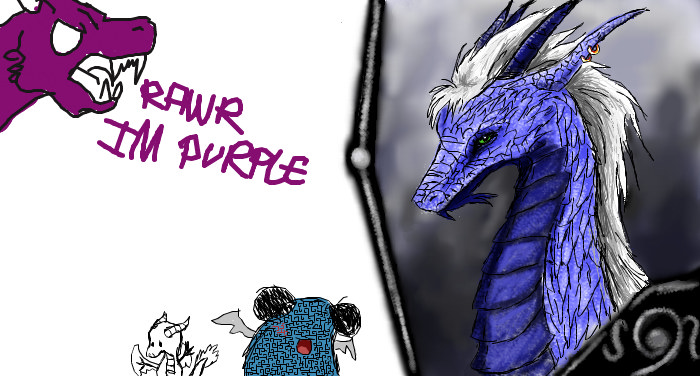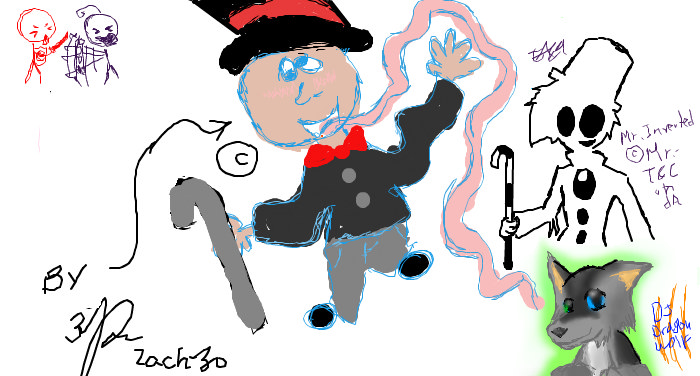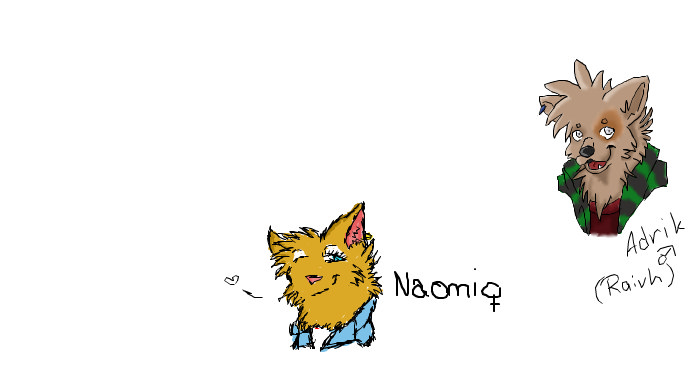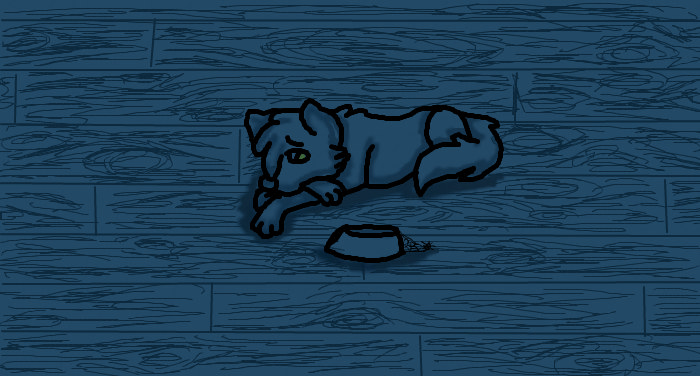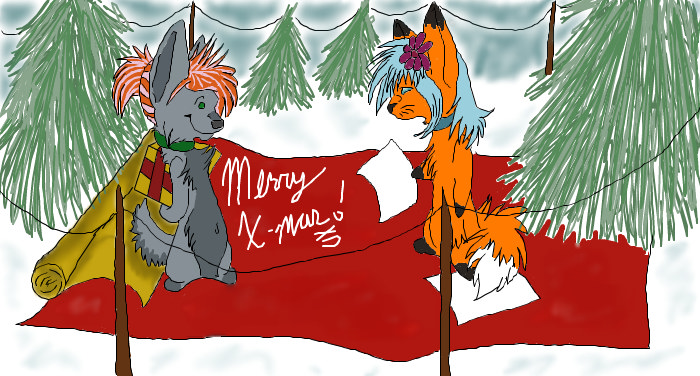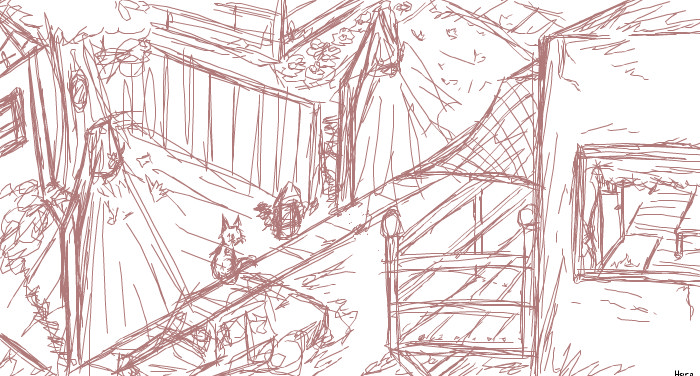Gnaarii
User Since:
• <i>A Brief Introduction to RPing/Writing • Reverting Back to Basics 1.) Grammar 2.) Spelling 3.) Common Mistakes: “Do I really do that?” • What To Do and Not To Do During Role-play • Coming Up With a Character • Traveling the World (Imaginary or Real) for the Perfect Setting • Concocting an Awesome Plot <b><u>A Brief Introduction to RPing/Writing</b> Alright! Fall into line troops because this is a battle where I intend to be the victor! If you’re reading this, it means that either you have a desire to further yourself as a writer, a role-player (which is still technically a writer), or both. Good, glad to hear it, because nowadays it seems like people don’t know a thing about how to write a decent sentence, not to mention a paragraph! However, just writing something that is both correct grammatically and is lacking any and all spelling errors isn’t all there is to know about making a piece of literature (whether story or RP) complete. We’ve all come across that ‘one guy’. You know who I’m talking about. Yes, that he or she who makes you want to slit your wrists, dig your eyeballs out with a spoon, tape tacks to your chair, or, on a less morbid note, they just flat out put you to sleep. You have to make what you write interesting! Don’t tell me you enjoy reading a book without good detail, and if you were thinking about it, don’t, because I would call you insane and then write you off as a moron in my handy-dandy notepad. Now, there are cases where you may exempt the laws of grammar and spelling, sort of like a creative license, but there are only a few, so don’t get carried away. Instances such as these are when using dialogue or to get a point of emphasis across to your reader(s), but we’ll get more into detail with this later. Here’s to your journey “Huzzah!” now go forth, read, and prosper! *Note: If you happen to come across someone who writes with a certain spelling ‘issue’, for example they write color as ‘colour’, don’t flame! First of all, I will personally come and eat you in your sleep. Yes, eat you. Second of all, there are specific characteristics bound to various regions of the world where the way they spell varies, though it is not to the extreme and typically you can decipher the spelling you’re used to. <b><u>Reverting Back to Basics</b> <b><u>1.)</b></u> Grammar, it’s never fun, no one likes it, and most people don’t have a clue how to use it properly. However, that’s one of the reasons I’m here to help, and because I’m an AP English student, I feel that perhaps I can assist you in at least a few ways (especially with the notes I took, let me tell you, d-e-t-a-i-l-e-d). Now, many of you may have heard of ‘the 8 parts of speech’. Well, have you? If you haven’t, that’s okay, because it’s going to be explained shortly, followed by a <i>somewhat</i> detailed outline of other grammatical aspects. But don’t thank me! Thank all of my wonderful teachers, for it was they who enlightened me that I <b>epically failed</b> at grammar not so long ago. In other words, like a freakin’ year ago! <b><u>The Magic Number 8</b> Okay, so think of the eight parts of speech like one of those little black balls (Magic-8-Ball) that tells you bogus predictions, only think of the eight parts of speech as something better. For example, your best friend for life! Literally, because without them it’s going to be difficult to get far in the world, be it business or academics. 1.) Noun- person, place, thing, or idea 2.) Pronoun- replaces 1+ nouns or pronouns 3.) Verb- expresses actions/state of being and is necessary to make a completed statement 4.) Adjective- limits the meaning of a noun or pronoun by modification 5.) Adverb- makes the meaning of verbs, adjectives, and other adverbs more specific through modification 6.) Conjunction- joins words or word groups (phrases and clauses) 7.) Preposition- exemplifies relationship between a noun or pronoun to another word in the sentence 8.) Interjection- a word expressing emotion/feeling, but it lacks any grammatical relationship to the rest of the sentence <b><u>Nouns and Pronouns Further Explicated</b> Well, this is going to be short. It’s about nouns! Who doesn’t understand what a freaking noun is? Don’t answer that, you fool, it was rhetorical! - nouns can be singular (do not end in ‘s’): cat, dog, mouse, hog, and so on - nouns can be plural (usually end in ‘s’): cats, dogs, mice, hogs, and so on - nouns are freaks and have special cases where the singular version of itself is the plural version as well: sheep (singular) and sheep (plural) - nouns can be collective: “Let’s go <u>team</u>!” other examples include, but are not limited to: family, audience, jury - indefinite pronouns- general reference to persons, places, or things (as opposed to a specific reference of a noun) Typically dealing with endings of ‘one’, ‘body’, or ‘thing’. <b><u>Pronoun Antecedent Agreement</b> Okay, don’t flip out here. I know, it’s a big word [antecedent], but it’s nothing to be afraid of! Maybe... - pronouns and antecedents agree in both number and gender: ‘Tommy’, the antecedent, would be replaced with ‘he’ in the following sentence: “Tommy went to the store to buy some catnip for his devil kitty.” Now with the pronoun: “He went to the store to buy some catnip for his devil kitty.” - *antecedents are NOT in prepositional phrases. No! Not even with your illogical logic-ness is it logical to place an antecedent in a prepositional phrase, you dork! <b><u>Direct Object/Indirect Object/Predicate Nominative/Predicate Adjective</b> - I spy an <i>action</i> verb! La! That means look for a <i>direct</i> object - to find said direct object, inquire “who” or “what” after the verb and it’ll be there - when in search of an indirect object, ask “to whom”, “for whom”, “to what”, or “for what” after the direct object - *direct and indirect objects, like antecedents, are NOT in prepositional phrases! - *got a linking verb? Then you’re in search of a predicate nominative (hint: noun-native (noun or pronoun)) or a predicate adjective - *predicate nominatives/adjectives AREN’T in prepositional phrases. Hm, sounds like several parts of grammar are prepositional-ist! >__> - Extra note- Object complement answers the question “what” after a direct object. Oh, and a little helpful tid-bit I learned is that the order in a sentence is as follows (dealing with grammar, that is): <i>SVIODO</i> (subject, verb, indirect object, direct object) <b><u>Verbs Further Explicated</b> Look Ma! Look Pa! Freddy’s out on the loose again! Alright, so verb, speaking of which, what’s your verb? Ha-ha, I know so funny, right? - singular verbs end in ‘s’, for example: “He (run/runs) the show.” The correct answer would be ‘runs’, so “He runs the show”, because ‘He’ is singular; therefore, ‘He’ receives a singular verb, which ends with ‘s’. - plural verbs obviously don’t end in ‘s’, you goober. - linking verbs- forms of ‘be’, examples include, but are not limited to, the following: is, are, was, were, has been, had, will be <b><u>Subject Verb Agreement</b> Gasp! Guess what! A word that refers to, get this, <i>one</i> person or thing is <i>singular</i> in number! No freakin’ way! I’m totally stunned, how ‘bout you? But wait! There’s more! Oh yes, a word referring to <i>more</i> than one person or thing is <i>plural</i> in number! Whoa! I didn’t know that! <sub>Yes I did, actually. O_O</sub> - singular subjects get singular verbs - plural subjects get plural verbs - the key word ‘and’ joining 2+ subjects together gets a plural verb - the key word ‘or’ joining 2+ subjects together, however, gets a singular verb <b><u>Conjunctions Further Explicated</b> Type A: Coordinating Conjunctions: for, and, nor, but, or, yet, so (FANBOYS) - *Note: ‘neither’ goes with ‘nor’, and ‘either’ goes with ‘or’ Type B: Subordinating Conjunctions: before, although, however, still... - *used in dependent, or ‘subordinate’, clauses - Examples: “Before we go to the beach, should we stop by the Sunshine Hut to get some equipment?” “We should stop by the Sunshine Hut to get some equipment before we go to the beach.” <b><u>Prepositions</b> Here, all you need to remember for prepositions is a pedestal, box, or other inanimate object to do the following to: on, around, through, beyond, below... <b><u>Interjections</b> Interjections are simple, however, you probably don’t realize that you use them in everyday conversations: Oh! Awesome! Dude! These are not limited to a simple explanation point to express feeling, nor are interjections combined with an explanation point always acceptable: “Oh, I see it was the comma section where I failed my test, because I happen to suck at comma usage.” <b><u>Other Grammar Stuff</b> <b>Participles</b> - look like verbs, however, they act like adjectives - ‘ing’= present ‘ed’= past - participle + modifiers/complements = participial phrase <b>Gerunds</b> - look like verbs, however, they act like nouns - end in ‘ing’ - gerund + modifiers/complements = gerund phrase <b>Infinitives</b> - look like verbs, however, they act like a noun/adjective/adverb - ‘to’ + base of verb, for example: “...to hike...” - infinitive + modifiers/complements = infinitive phrase <b><u>Structure of Sentences</b> Yikes! You aren’t tired of reading this yet? I’m impressed! Keep this up and you’ll be an exceptional role-player/writer! Independent Clause (IC) = subject + verb; can stand by itself as a sentence Dependent Clause (DC) = (occasionally starts with: subordinating conjunction) + subject + verb; cannot stand alone as a sentence <b>Types of Sentences</b> Simple = 1 IC Compound = 2+ IC Complex = 1 IC + (at least) 1 DC Compound Complex = 2+ IC + (at least) 1 DC <b>Action v. Passive</b> - active voice is, well, subject acting the verb out: “I whacked you with a wet noodle! Ha-ha!” - passive voice, however, the verb’s action is being implied on the subject: “I was whacking you with a wet noodle, but it’s still funny.” <b><u>The Terrifying Comma</b> - when separating 2+ adjectives, before a noun, use a comma Example: “My dog is weird, insane, and stinky today.” - DON’T use if one word is modifying another word in a series Example: “The cat has bright blue eyes.” Or after numbers/adjectives indicating size, shape, age, or material Example: “Three tiny triangular metal robot arms came flailing out of the box.” - use between ICs joined by a coordinating (FANBOYS) conjunction Example: “Drew wandered around the woods, and he picked up everything he found while on his little escapade.” - to show clarity Bad Example: “I walked through the doors and the dog ran ahead of me.” Correct Example: “I walked through the doors, and the dog ran ahead of me.” - when setting off non-essential clauses and phrases Example: The Japanese holiday of Oshogatsu, which has an incredible amount of preparation beforehand, begins on January 1. - With the exception of a prepositional phrase being immediately followed by a verb, use a comma after a series of prep. phrases Example: “Around the corner, over the rocks, through the bushes, and beyond the hill is my house. - after a (adverb) dependent clause at the beginning of a sentence Example: While I can endure most pain, grammar is something that seems to dwell on a completely different level. <b>Appositive Phrases</b> These are basically the ‘non-essential’ information that you feed your readers, however, it is an excellent asset when writing because it gives what you write detail, beefs it up a bit (typically we put commas around this stuff). Example: “That man, the one who’s sort of short and portly, is a pretty nice guy.” <b>Noun of Direct Address</b> You do this everyday too, guarantee it, unless you don’t talk much, and then maybe you don’t. In addition, a noun of direct address is typically found at the start of letters. - Example: “Sera, did you know you’re an awesome athlete?” <b>Semicolons and Colons</b> - use a semicolon to separate 2 ICs not joined by a coordinating conjunction (FANBOYS) Example: “I wish you wouldn’t do that; I know you will.” - use a semicolon between 2 ICs joined by a conjunctive adverb Example: “I love studying on occasion; however, if it’s for an extensive period of time, then it just winds up boring me.” - use a semicolon to separate items in a series, if they contain commas themselves Example: “My favorite candies are black jelly beans, with their awesome black licorice flavor; cinnamon hots, only because they burn my tongue off; and gummy bears, for they are the chewiest of the chewy candies. - after an IC, but before a list, use a colon (also when writing time, chapter and verse, and in salutation of a business letter) Example: There are many students running for student council, such as the following: Miranda, James, Tracy, Aaron. <b> Oh Yeah! Brackets and Ellipsis, Baby!</b> - use brackets to enclose information that clarifies Example: “She is an awesome person” “[Liza] is an awesome person.” - ellipsis are used to omit information without altering the intended message Example: “I think you are a....person who is learning about grammar.” <b>I’m not going to explain quotations to you because I don’t feel it’s necessary. However, if you do so desire to be informed of the so-called ‘detail’ that grammar wants to dish out for quotes, then feel free to comment and await my response.</b> <b>Spelling, It’s Easy!</b> IT’S EASY BECAUSE IF YOU DON’T KNOW HOW TO SPELL A WORD, LOOK IT UP, AND IF YOU WANT A BETTER VERSION OF THAT WORD, THEN GET A THESAURUS! OR, IF YOU’RE SMART, USE WORD, BUT WATCH OUT! SPELL CHECK WILL BITE YOU IN THE BUTT IF YOU DO ONE OF THE ‘COMMON MISTAKES’ I’M ABOUT TO EXPLAIN (PSST, THAT WAS A HINT! IF YOU ARE BAD AT GRAMMAR/SPELLING, THEN FAKE IT! USE WORD!)! <b>Common Mistakes: “Do I really do that?”</b> I’m sorry to tell you, but the answer is a probable yes. Most people tend to make such simple mistakes that deal with spelling and grammar all in one! Basically you think you’ve gotten something correct because it looks right, but it’s really fooling you into making yourself look ignorant. This is just a collaboration of some small errors that I catch nearly every time I read something written by other people, even teachers, which is a scary thought! Again, spell check can’t do everything for you, so memorize the following and the world will fall back into place, sort of. (*contraction is combining two words with an apostrophe) - the use of ‘to’ instead of ‘too’ ‘to’ is directive, and typically means toward ‘too’ means overly, also/in addition, etc. - the misuse of ‘your’ and ‘you’re’ ‘your’ is possessive- example: “Is that your flying llama?” ‘you’re’ is directive (contraction for ‘you are’)- example: “Oh! You’re the flying llama!” - confusing ‘their’, ‘there’, and ‘they’re’ with each other ‘their’ is possessive- example: “I think it’s theirs.” ‘there’ is a place/points something out- example: “It’s over there by the flying llama.” ‘they’re’ is directive (contraction for ‘they are’)- example: “They’re going to ride that freakish llama that flies!” <b><u>What To Do and Not To Do During Role-play</b> <b>Do</b> Put simply... - Keep things interesting for your partner by adding detailed description in your posts. The same could be said when writing stories and such. - Use proper grammar and spelling. You want to at least appear like you know what the hell you’re doing, and the more you project yourself as someone who is literate, the more you’re going to seem a credible RPer/Writer. - Make sure your characters are suitable for whatever type of RP you’re participating in, and if they aren’t, more specifically, if your character doesn’t work with the person you’re wanting to RP with, don’t be a butt! - See if the person you’re role-playing with has any boundaries, such as they don’t like swearing, intimacy between characters, etc. - Offer to give the person you’re planning on role-playing with an example post, something you’ve written before that will prove to them you have that certain ‘spark’ they’re looking for (if you’re the one who requested the role-play, then I suggest you do this to make sure they’re what you’re looking for. You don’t want to role-play with someone who’s going to bore you, right?) <b>Don’t</b> Put simply... - Reiterating, DON’T BE A BUTT! - Don’t have your partner think of every thing; especially if you’re the one who requested the role-play, however, it is a good idea to get his or her input. After all, they’re writing in a partnership with you, so you want to make sure it’s enjoyable for them as well or it won’t be a very long-term RP. - DO NOT, DO NOT, DO NOT live in your partner’s post! This is THE most irritating thing I’ve EVER had happen to me in a role-play! How on earth do you expect me to write something you merely copied off of me with a few minor adjustments? This is one of the fastest ways to lose a partner and never ever, ever be considered again in future RPs. Not to mention it hinders you from exercising your skills as a writer! Remember, detail, detail, detail! Example: With his arms plastered to his sides, fingers curled into tightly clenched fists, and teeth bore with a sinister aura emitting from his entire being, the creature advanced toward his adversary. If the enemy were not his best friend, then it would have been most difficult to control his anger. “What the hell were you thinking, hitting on Joli like that, Carter? Huh? What the hell were you thinking?” he inquired, though it was more of an animal-like snarl. Taking a step forward, he shook his head, lowered his defenses, and inhaled slowly to try and calm himself. The only time Ray was ever provoked into a fiery rage was when another guy fooled around with his girl. Slowly, he lifted his head, shook it once, and turned from Carter, dismissing himself from the ghastly looking presence across the room. Poor Follow-up Example: Ray looked angry with his arms pressed tightly to his sides, fangs protruding over his lower lip, and an accusatory look on his face. Never before had Carter seen his friend so full of spiteful ire. It was quite the depressing scene for him, and he stared across the room as his friend questioned the actions he had taken with Josi, Ray’s girlfriend. “I guess I wasn’t thinking,” he mumbled, slipping his hands into the pockets of his jeans as he watched his friend leave the room. - Now, on a side note, and despite the fact that I suck at trying to stick within the realms of other people’s posts, what could have happened here was expansion. When I say expansion, I mean taking the first part of your post, making it coincide with your partners, but then furthering it to keep the role-play moving and interesting. - Another thing you don’t want to do is begin each sentence in a repetitive manner: “She walked to the beach. She bought an ice cream cone at the beach. She slept on the sand. She blah, blah, blah...” (Use prepositions, appositive phrases, THE 4 SENTENCE STRUCTURES, etc.) - Don’t leave for hours on end and let your partner sit there like “Are they going to respond?” If you’ve got to do some business in the privy (AKA the bathroom), go quickly, because, hey, everyone has to go on occasion. This also applies to those folks who like to do multiple role-plays at a time, which is fine, but don’t make a person wait forever for a follow-up post, unless they’re aware that you’re going to do so. <b>Coming Up With Characters</b> - Name: Okay, now this is a given, but you might want to consider this as the LAST part when creating a character. The more you know about your own creation, the closer you are to him/her/it; therefore, the better off you’ll be when it comes to deciding on a name. By the way, searching name lists isn’t a bad idea, especially if you’re sitting in that ‘rookie’ boat right now. - Gender: Male/Female...IT - Age: Personally, I don’t find this too important, but for some people it is, so either pick your favorite number or just put down something random. - Species: What is your character? It’s as simple as that. - History/Background: Try to make this interesting, but not in the realm of COMPLETELY INSANE. If you’re having trouble thinking of a history/background then I would advise you to just write a short story dealing with said character. Maybe after doing this little ‘test’ you yourself will be able to get a better visual of your character, and therefore be able to compile enough information about what made your character who he, she, or it is. (Why does he/she/it lead the life he/she/it leads? How did they get to where they are now? What is that which they seek?) - Personality: Once you have a history/background establish for your character, this should be an easy aspect to hammer in the wall. Is he/she/it kind, caring, deceitful, haughty, and so on? Are there any defining flaws in your character? Flaws, in case you didn’t know, make for a more fascinating character because it brings them down to a level that people can relate with. - Physical Traits: Describe what your character looks like, but use detail! The better portrayal you give of your character, the easier it will be for people to visualize him/her/it. - Is your character from the modern world or some other era? Personally, I would set up an outline for a modern bio and a historic bio, just in case you have a partner who isn’t so great at one or the other. <b>Traveling the World (Imaginary or Real) for the Perfect Setting</b> Setting, it’s extremely important to any story or role-play, and creating something that’s going to catch a reader’s interest can be a difficult process. When using real-world settings, most often people aren’t going to get out and travel the world just to come up with an awesome setting, so we research. I know, it sucks, but it will give you a general understanding of whatever region you’re writing/role-playing about. Now, if you don’t want to role-play in real-life places, then there’s always inventing a new world! Or a city, town, suburb, and such if you aren’t creative enough to do that. Think of both natural and man-made landforms, such as mountains, rivers, lakes, plateaus, fjords, oceans, capes, skyscrapers, houses, cabins, gas stations, bars/clubs, theatres, and the like. Do you desire to place your character in a rural area, a suburban area, or an urban area? I find that creating my own worlds makes for a more interesting role-play, though sometimes it can be a hindering experience when your partner doesn’t see everything that’s in your mind’s eye! What season is it in your setting? What’s the weather like? Did you know that even a character’s clothing is part of setting? Yeah, that’s why I’m telling you to write with...what now? DETAIL! <b>Concocting an Awesome Plot</b> Plot isn’t really as difficult as people make it out to be. What are your personal interests? -Comedy -Drama -Romance -Action -Adventure -Sci-Fi -Mystery -Horror *Combinations of the above and others not mentioned Once you decide on a genre, pick a character that you think will best suit it, and make sure it coincides with your basic setting. Don’t just ‘request’ something like “Hey! Anyone want to RP?” because that just gives people the impression that you’re not going to be a very talented writer/role-player. Take into consideration the fact that your partner may want to discuss the plot with you to make sure that it’s something they’re really going to be intrigued by, and, who knows, maybe they’ll give their own input on the subject! You know you’ve found a good partner if they’re willing to put forth the effort to make a role-play worth your while as well. Note, there may be alterations made to a plot as you go along, so just go with the flow, however, if it turns into something you didn’t want, then either ask them to do a repost, or simply explain why you’re terminating the role-play. Happy writing/role-playing, folks! =) Remember, if you have trouble writing in tiny chat boxes, use MSWord, notepad, or some other software with similar formatting.
